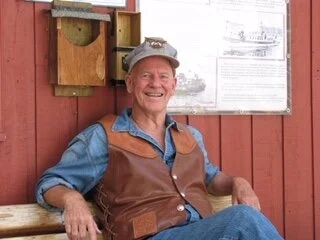The Naramata Trilogy
Creating this Naramata Trilogy has been a highly rewarding multi-year labour of love.
The three songs tell Naramata’s story from its first founding to the vibrant yet idyllic village (no sidewalks, no traffic lights) that we enjoy today.
NARAMATA’S CALL was first heard in our Centennial play “Robinson’s Rainbow”. It talks about those who were drawn together to create this community and doesn’t dodge the issue of those who weren’t invited.
NAMING NARAMATA introduces the mystic Anna Gillespie, one of our first settlers and describes the theatrical experience she conducted from which our community’s name emerged. (Warning: actual seance included.)
NARAMATA I’M COMING HOME is the best known song of this trilogy. It’s story was included in Craig Henderson’s “Naramata Chronicles” and it has been publicly performed at happy events like the Opening Ceremony for the monument in Wharf Park as well as more somber occasions like the Celebration of Life for a long time Naramata resident. The song’s widest acclaim came once it was adopted by organizers of Naramata’s Farm Worker’s Dinner. It was performed lustily by local volunteers at every Farm Workers Dinner and went over very well when followed by dessert.
Naramata’s Call
Here’s a musical trip through Naramata’s history as it unfolded from being a gleam in JM Robinson’s eye to becoming the idyllic community we enjoy today. Originally I’d hoped to tell our story with help from the rich trove of historical images available at the Naramata Museum. Alas, even with a discount on image costs, this route proved too expensive for a Brakeman’s budget. Plan B was to shoot footage at JM’s home, currently the Naramata Inn. Covid sunk that option. Plan C before you, uses the history that surrounds us (Wharf Park, Francis Hadfield’s wonderful mural on the Wine Vault, Manitou Park and our Museum) as backdrops to tell our tale. Instead of historic photo’s you get Brakeman Jack’s virginal lip-sync effort! Be gentle.
Naming Naramata
The name “Naramata” first emerged from a séance conducted by psychic Anna Gillespie at the request of community founder J.M. Robinson. Robinson was such a strong believer in Spiritualism that when he began prospecting in the Okanagan Valley in the 1890s, he brought along a mystic advisor whom he hoped would “sense” the mineral wealth in the hills. The mother lode Robinson discovered lay not in gold, but in property development.
By 1906, Robinson was flying high. With the backing of the CPR and the Bank of Montreal, he had founded two prosperous communities—Peachland and Summerland—each name having a subtle spiritual connection.
In 1907, he sought a name for his newest community, a Brigadoon-like English village complete with a cricket pitch, rowing regattas, and an opera house (plus a yearly Maypole dance), situated at Nine Mile Point across the lake from Summerland. This village was to be a retreat for the elite, with no “garlic-eating foreigners” allowed.
At the time, Robinson’s spiritual advisor was Anna Gillespie (1856–1926), a refugee from the great San Francisco earthquake of 1906. Anna conducted a séance—the details of which are included in this song—that resulted in the creation of the name “Naramata.”
Here’s the real story of that event:
Naramata, I’m Coming Home
This song is about TODAY. The Naramata WE experience. It’s a song that has enjoyed a wonderful transition over time. It began as home thoughts while I was returning from from a musical road trip. The first Naramatians to hear it were Bert and Stu Berry as I sat out front of the Museum. They LOVED it! Carol Beishman liked singing it so much that I was asked to perform it at her Celebration of Life. NARAMATA, I’m Coming Home” was also sung at the dedication of the Legacy Monument in Wharf Park and it’s story was included in Craig Henderson’s “Naramata Chronicles”. A BIG change occurred when the song became a traditional serenade performed by community volunteers at Naramata’s annual Farm Workers Dinner. The volunteers enjoyed singing it and the pickers enjoyed singing along. Because this song was now being sung by a choir of Naramatians, I changed the lyrics to reflect that fact. Songwriters get to do this.

